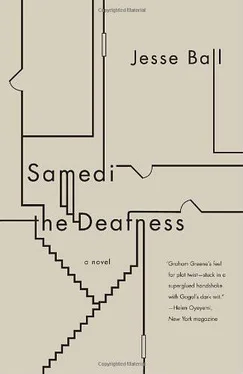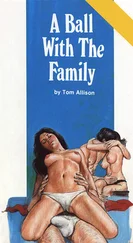James turned his head sharply. Carlyle, surprisingly, seemed to blush slightly.
— We've been friends since childhood, he explained, and she confides in me.
Finally they reached the last row of bottles. There must be thousands of bottles down here, thought James. He had never seen so much wine in one place.
— I am told, said Carlyle, that this is one of the finest collections outside of France. Of course, it is not just wine. There are fine sherries, cognacs, whiskeys. Stark delights in waiting for the experts to declare that there are no more bottles of such and such left in the world. Then he produces one and sells it for a huge price, and then gives the money to charity. He is a great man.
— How did you meet him? asked James.
He turned down the last aisle and walked along, running his hand over the wine bottles. In the low light it was hard to tell, but they certainly looked old. He took one out. ST. GROUSARD, 1806,it said.
— That's certainly not drinkable, said Carlyle. Just for show, for pleasure. Did you know that when Napoleon lost and the vineyards of France were stripped bare, the wine cellars robbed of all their bottles, it turned out to be a sort of boon, because after the great mass of armies had receded to Germany, to Austria, to England, to Russia, to Poland, to Spain, after some years had passed, and France was rebuilding itself, orders began to pour into the same vineyards that had been robbed. The soldiers, the officers, they remembered the glorious wines they had found, and they wanted more.
James felt himself liking this odd young man. He repeated his question.
— How did you meet this Stark?
Carlyle twitched at the word Stark .
He must not have meant to reveal that, thought James. I've gained something.
— My parents died when I was quite young, said Carlyle. He took me in and raised me as his son. I always thought I would marry Grieve, but then, five years ago, I began to get horrible headaches. I changed. I became withdrawn, refused to speak to anyone. Stark had doctors come. They told him I had a tumor in my head the size of a fist, and that I would die within the month.
— But that was five years ago?
— I didn't die that month, said Carlyle.
A gentle smile touched his lips.
— Nor any of the months after that. But my ideas changed. I decided I would not betroth myself to anything, not to an idea, not to a person. That's when I began my studies in earnest.
He looked away into the dark and nodded to himself.
— I always thought, said James, that a sudden death would be best.
— They say mine will be preceded by days of intense headache culminating in a blinding pain that feels, as others have described it, like the light of the sun descended into one's eyes. I have read accounts of it, accounts of such deaths. I do not envy myself what's to come.
— But it's been five years, said James. The tumor must have shrunk.
— I have it looked at every now and then. On my birthday, actually. It's a sort of joke. It hasn't shrunk. Not a bit. But it hasn't grown.
James thought it over.
— So you and Grieve used to, you know. .
— No, said Carlyle, laughing. We only thought we would be for each other, one day, long into the future.
James and he had begun the walk back to the stairs. He continued laughing.
— You are welcome to try keeping her happy. No one, of course, has ever succeeded in that.

Carlyle was gone. They had parted when they reached the hall. James felt uncertain. He seemed to be staring at a broad sheet of paper spread out upon the ground, and all the letters were wiggling and moving of their own accord whenever he looked closely.
He would go back up to his room and see what the day looked like through the windows of the room in which he had woken with Lily Violet.
In the Pillow
In the pillow no note from Grieve. No notes either upon the shelf.

An hour passed. He fell asleep and woke in the chair. Somehow the maid had been and gone, for in the pillowcase was a note from Grieve.
It said:
No one spoke of you yet today or acknowledged your existence. I shouldn't wonder if they let you go soon.
This was disturbing to James, who, like anyone, did not like being so easily forgotten. After all, he thought, I spoke with the dying McHale. I know the whole plot. They can't forget me so easily. Besides, he thought, Carlyle said they'd been speaking of me. But he thought of McHale's brusqueness on the porch.
You know nothing, came the room's quiet reply. And it was true. What had he found out? If this decimal were to be placed like light in a tube then in what becoming would he have failed? He could name three: the first, his dying trust; the second, that owed those he loved (who did he love?); and the third, his own.
And so in the room James sat and thought how useless the pistol was to him, and how if only he could find his way through these habits and rules to the heart of the game being played. .
He felt a horror at incidental things, at the dust in corners, the folding of cloth, the feel of paper.
James had seen two men die in the space of two days, and both of their dying was partly his fault. He had kept the thought far from him, but it was undeniable. In the brackets and boxes of his voluminous memory were all the impressions, labeled and fitted, of both deaths. There would be for him no easy forgetting.
A Lesson
When James had applied for the work, taken and passed the necessary examinations, been shown to the back room, fitted with a suit, fingerprinted, voice-tested, lie-detectored, he came before a powerful man, the owner of the firm.
— You are young, no? said the man. Younger than we like here. You know, we like a man to have a bit of experience before coming to us. We feel it puts him on better footing with those he will find it necessary to interact with as a professional.
James said then that he certainly had been around, had traveled extensively, and was well versed in the fields adjoining that of this profession.
— But that's the thing, don't you see, the man had said. There's no way to know what will be required. You have to make a study of everything. And, of course, he said, once you put something in, it never comes out. The training is quite effective that way.
He took James by the arm and led him to the window.
— How old are you? he asked.
— Twenty years to the day, said James.
— To the day, said the man quietly, as if musing. To the day. You have to know what you're getting into. It is a strange life, that of the mnemonist. It is most difficult to form relationships. Many of our best find their lives are lonely. Of course, the remuneration is great. You will find the work easy, though the travel is time-consuming. And truly, I mean it. You will hardly forget a thing once you have gone through the training. When are you scheduled?
James said that he was to begin the next week.
— So, you will be twenty-three when the training is done, said the man.
He pressed a buzzer on his desk. A man came to the door.
— Sir?
— This Sim. I would like his progress monitored. I would like to be personally apprised of it.
— That can be done. Certainly, sir.
— Very good.
The owner made an away-with-you gesture with his hand, and the man disappeared through the door.
I wonder, thought James to himself. Will I begin to remember older things more clearly, or just things from now on?

Читать дальше













